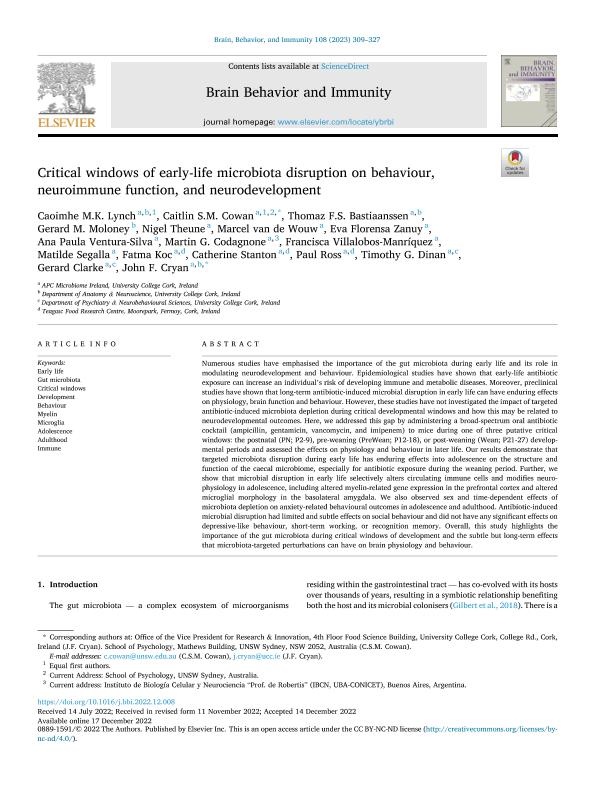Artículo
Critical windows of early-life microbiota disruption on behaviour, neuroimmune function, and neurodevelopment
Lynch, Caoimhe M.K.; Cowan, Caitlin S.M.; Bastiaanssen, Thomaz F.S.; Moloney, Gerard M.; Theune, Nigel; van de Wouw, Marcel; Florensa Zanuy, Eva; Ventura Silva, Ana Paula; Codagnone, Martín Gabriel ; Villalobos Manríquez, Francisca; Segalla, Matilde; Koc, Fatma; Stanton, Catherine; Ross, Paul; Dinan, Timothy G.; Clarke, Gerard; Cryan, John F.
; Villalobos Manríquez, Francisca; Segalla, Matilde; Koc, Fatma; Stanton, Catherine; Ross, Paul; Dinan, Timothy G.; Clarke, Gerard; Cryan, John F.
 ; Villalobos Manríquez, Francisca; Segalla, Matilde; Koc, Fatma; Stanton, Catherine; Ross, Paul; Dinan, Timothy G.; Clarke, Gerard; Cryan, John F.
; Villalobos Manríquez, Francisca; Segalla, Matilde; Koc, Fatma; Stanton, Catherine; Ross, Paul; Dinan, Timothy G.; Clarke, Gerard; Cryan, John F.
Fecha de publicación:
02/2023
Editorial:
Academic Press Inc Elsevier Science
Revista:
Brain Behavior And Immunity
ISSN:
0889-1591
Idioma:
Inglés
Tipo de recurso:
Artículo publicado
Clasificación temática:
Resumen
Numerous studies have emphasised the importance of the gut microbiota during early life and its role in modulating neurodevelopment and behaviour. Epidemiological studies have shown that early-life antibiotic exposure can increase an individual's risk of developing immune and metabolic diseases. Moreover, preclinical studies have shown that long-term antibiotic-induced microbial disruption in early life can have enduring effects on physiology, brain function and behaviour. However, these studies have not investigated the impact of targeted antibiotic-induced microbiota depletion during critical developmental windows and how this may be related to neurodevelopmental outcomes. Here, we addressed this gap by administering a broad-spectrum oral antibiotic cocktail (ampicillin, gentamicin, vancomycin, and imipenem) to mice during one of three putative critical windows: the postnatal (PN; P2-9), pre-weaning (PreWean; P12-18), or post-weaning (Wean; P21-27) developmental periods and assessed the effects on physiology and behaviour in later life. Our results demonstrate that targeted microbiota disruption during early life has enduring effects into adolescence on the structure and function of the caecal microbiome, especially for antibiotic exposure during the weaning period. Further, we show that microbial disruption in early life selectively alters circulating immune cells and modifies neurophysiology in adolescence, including altered myelin-related gene expression in the prefrontal cortex and altered microglial morphology in the basolateral amygdala. We also observed sex and time-dependent effects of microbiota depletion on anxiety-related behavioural outcomes in adolescence and adulthood. Antibiotic-induced microbial disruption had limited and subtle effects on social behaviour and did not have any significant effects on depressive-like behaviour, short-term working, or recognition memory. Overall, this study highlights the importance of the gut microbiota during critical windows of development and the subtle but long-term effects that microbiota-targeted perturbations can have on brain physiology and behaviour.
Archivos asociados
Licencia
Identificadores
Colecciones
Articulos(IBCN)
Articulos de INST.DE BIOLO.CEL.Y NEURCS."PROF.E.DE ROBERTIS"
Articulos de INST.DE BIOLO.CEL.Y NEURCS."PROF.E.DE ROBERTIS"
Citación
Lynch, Caoimhe M.K.; Cowan, Caitlin S.M.; Bastiaanssen, Thomaz F.S.; Moloney, Gerard M.; Theune, Nigel; et al.; Critical windows of early-life microbiota disruption on behaviour, neuroimmune function, and neurodevelopment; Academic Press Inc Elsevier Science; Brain Behavior And Immunity; 108; 2-2023; 309-327
Compartir
Altmétricas



